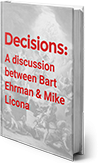Jesus – God
“‘We are not stoning you for any of these [miracles],’ replied the Jews, ‘but for blasphemy, because you, a mere man, claim to be God.'” (John 10:33) Although Jesus claimed to be the divine Son of God, Christians believe that He is also “God the Son.” But did Jesus ever claim to be “God” or is this a belief that evolved over time?
It is true: There are no records in our possession today that record Jesus saying, “I am God.” Yet evangelical Christians hold firmly to the belief that He is God. Is such a belief justified or should we stop at what has thus far been established: Jesus thought of Himself as uniquely divine, being evident through His claims to be the Son of God and the Son of Man.
While the New Testament writers never record Jesus uttering the words, “I am God,” they do tell us a lot about whether Jesus thought of Himself as God. Let us look at this from two angles: 1) Did Jesus’ words indicate that He thought of Himself as God? and 2) Did Jesus’ original disciples and apostles believe He was God?
Jesus understood that worship was for God alone. While tempted by Satan in the wilderness, He was shown all the kingdoms of the world. Satan said, “All this I will give you if you will bow down and worship me.” Jesus responded that we are to “[w]orship the Lord your God, and serve him only.” Yet, He accepted worship. In Hebrews 1:6, the author writes, “And let all the angels of God worship him.”
In a startling passage, Jesus claims to have authority over the Sabbath day which God had instituted. At first read, we may not stop and give Jesus’ words much attention. However, the equivalent in today’s culture might be a prominent Christian leader caught in adultery and when called to give an account on the evening news for breaking one of the ten commandments responds, “Don’t you know that I have sovereign authority over the ten commandments?” He would be claiming God’s authority. Imagine being pulled over by a police officer for speeding and going through a red-light. He informs you why he pulled you over. What would he think if you responded, “I have authority over the traffic laws and have done nothing wrong.” Only those who have the authority to set the laws have authority over those laws. This authority cannot be explained as Jesus acting as God’s spokesman. When the prophets acted as God’s spokesman, they said, “Thus says the Lord!” Jesus, however, spoke differently. Instead of saying, “Thus says the Lord,” he said, “Truly, truly, I say to you!”
Jesus’ disciples seemed to think of Him as God. Consider doubting Thomas upon seeing the risen Jesus responds, “My Lord and my God!” Consider John who refers to Jesus as the “Word” in the beginning of his Gospel. In the first verse he writes, “In the beginning was the Word, and the Word was with God, and the Word was God [italics mine].” Consider Paul who writes, “For in Him [Christ], all the fullness of deity dwells in bodily form.” The original Greek word for “deity” refers to the one who occupies the divine office and possesses all divine power. This verse states that all the fullness (nothing excepted) of God’s essence dwells in Christ in bodily form. As an engineer visiting from Greece once commented to me, this verse in Greek states that “God came down and put on a body!” Consider Peter who writes of “the righteousness of our God and Savior Jesus Christ . . .” While it is true that the original Greek grammatical structure of this phrase could be referring to two persons (i.e., our God [person 1] and Savior Jesus Christ [person 2]) instead of one (i.e., our God-and-Savior Jesus Christ), this is highly unlikely. Throughout the remainder of 2 Peter, the author uses the same grammatical structure used in this verse four other times. In every case it is clearly referring to one person.
In conclusion, we have seen that Jesus spoke and acted as though He were God Himself. We have also seen that those who knew Him best (Peter, John, Paul, Thomas) spoke of Him as God in no uncertain terms. Therefore, Jesus and His disciples thought of Himself as more than just a man, more than a divine being or a sort, but that He was God Himself!





